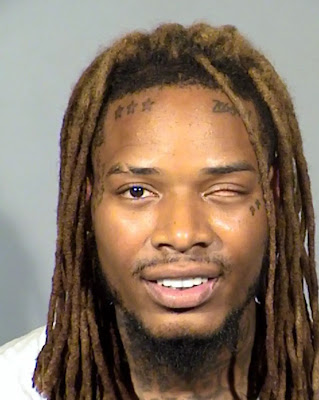Rapper Fetty Wap Sentenced to Six Years in Federal Prison for Drug Trafficking
 |
| Fetty Wap |
The sentencing took place on Wednesday in federal court on Long Island, New York.
Maxwell, having pleaded guilty in August 2022 to a conspiracy drug charge, faced a mandatory minimum sentence of five years.
During the court proceedings, Maxwell expressed remorse for his actions, acknowledging, "My selfishness and pride have landed me in this position today."
His defense team attributed his involvement in drug sales to financial hardships arising from the COVID-19 pandemic.
In October 2021, Maxwell and five co-defendants were apprehended following allegations of participating in a drug-smuggling conspiracy that brought substantial amounts of heroin, fentanyl, and other narcotics into the New York City area. The charges involved the possession and distribution of over 100 kilograms (220 pounds) of illicit substances, including heroin, fentanyl, and crack cocaine, between June 2019 and June 2020.
Prosecutors revealed that the drug-trafficking operation relied on the use of the U.S. Postal Service and vehicles equipped with concealed compartments to transport drugs from the West Coast to Long Island. The drugs were subsequently stored for distribution among dealers in Long Island and New Jersey.
Maxwell's guilty plea specifically pertained to the conspiracy to distribute and possess controlled substances, the primary charge in the indictment. By avoiding conviction on all charges, Maxwell evaded the possibility of a life sentence. It is worth noting that his plea exclusively pertained to cocaine-related charges.
While Maxwell's defense attorneys advocated for a minimum five-year prison term, the prosecution sought a longer sentence. Defense attorney Elizabeth Macedonio expressed her regret, describing it as a "tragic day" for Maxwell, a native of Paterson, New Jersey. Macedonio emphasized Maxwell's acceptance of responsibility for his actions.
Assistant United States Attorney Christopher Caffarone made it clear that the prosecution's case remained impartial to Maxwell's celebrity status as a performer, stating firmly, "The defendant did, indeed, engage in drug sales. The defendant did, indeed, sell cocaine."
Addressing Maxwell directly, Judge Joanna Seybert acknowledged his potential and encouraged him to make the most of it, saying, "You possess immense opportunities. Endeavor to utilize them effectively."
Maxwell gained widespread recognition in 2015 with his debut single "Trap Queen," which reached the No. 2 position on the U.S. Billboard Hot 100 chart. The song's melodic yet gritty style explores themes of loyalty, even in the context of drug-related activities. In 2016, Maxwell earned two Grammy Award nominations for his notable contributions to the music industry.
His defense team attributed his involvement in drug sales to financial hardships arising from the COVID-19 pandemic.
In October 2021, Maxwell and five co-defendants were apprehended following allegations of participating in a drug-smuggling conspiracy that brought substantial amounts of heroin, fentanyl, and other narcotics into the New York City area. The charges involved the possession and distribution of over 100 kilograms (220 pounds) of illicit substances, including heroin, fentanyl, and crack cocaine, between June 2019 and June 2020.
Prosecutors revealed that the drug-trafficking operation relied on the use of the U.S. Postal Service and vehicles equipped with concealed compartments to transport drugs from the West Coast to Long Island. The drugs were subsequently stored for distribution among dealers in Long Island and New Jersey.
Maxwell's guilty plea specifically pertained to the conspiracy to distribute and possess controlled substances, the primary charge in the indictment. By avoiding conviction on all charges, Maxwell evaded the possibility of a life sentence. It is worth noting that his plea exclusively pertained to cocaine-related charges.
While Maxwell's defense attorneys advocated for a minimum five-year prison term, the prosecution sought a longer sentence. Defense attorney Elizabeth Macedonio expressed her regret, describing it as a "tragic day" for Maxwell, a native of Paterson, New Jersey. Macedonio emphasized Maxwell's acceptance of responsibility for his actions.
Assistant United States Attorney Christopher Caffarone made it clear that the prosecution's case remained impartial to Maxwell's celebrity status as a performer, stating firmly, "The defendant did, indeed, engage in drug sales. The defendant did, indeed, sell cocaine."
Addressing Maxwell directly, Judge Joanna Seybert acknowledged his potential and encouraged him to make the most of it, saying, "You possess immense opportunities. Endeavor to utilize them effectively."
Maxwell gained widespread recognition in 2015 with his debut single "Trap Queen," which reached the No. 2 position on the U.S. Billboard Hot 100 chart. The song's melodic yet gritty style explores themes of loyalty, even in the context of drug-related activities. In 2016, Maxwell earned two Grammy Award nominations for his notable contributions to the music industry.


![The Future Is Here: Real Hoover Boards hit the market! Tony Hawk Rides One [video]](https://blogger.googleusercontent.com/img/b/R29vZ2xl/AVvXsEhhiHEKD_9ZITVw___GyPe4-64VlRnpJpKfphnk0efU9-9GTE7DWXuHsYEa_Cy8ukEdvHOAFmDQWCfaH47hYdBsOwC15_AKwSYcztH9m5elpbTx8P8vVhfFw7E2aYktEWyJTGxd6rxd23g/s72-c/Capture+22.JPG)


No comments